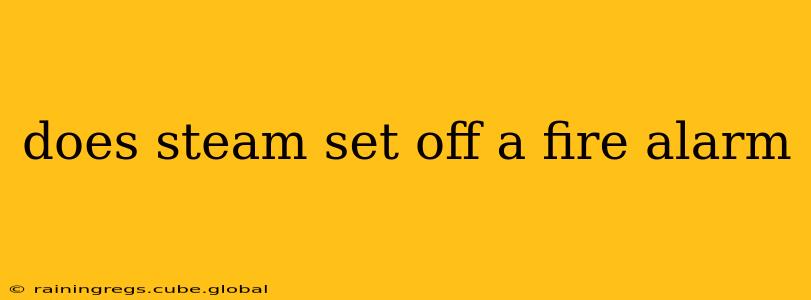Does Steam Set Off a Fire Alarm? Understanding the Science and Safety
The question of whether steam sets off a fire alarm is a common one, and the answer isn't a simple yes or no. It depends on several factors, primarily the type of fire alarm and the amount of steam present. Let's delve into the specifics.
How Fire Alarms Work:
Most modern fire alarms use ionization or photoelectric sensors to detect fires.
-
Ionization smoke detectors: These use a small amount of radioactive material to ionize the air between two electrodes. Smoke particles disrupt this ionization, triggering the alarm. They're generally more sensitive to fast-flaming fires.
-
Photoelectric smoke detectors: These use a light source and a sensor. Smoke entering the chamber scatters the light, triggering the alarm. They're typically more sensitive to smoldering fires that produce larger smoke particles.
Steam and Fire Alarms: The Interaction
Steam, in itself, doesn't contain the particles that typically trigger fire alarms. However, several scenarios could lead to a false alarm:
-
High-density steam: Extremely dense steam, such as that produced by a large burst of boiling water, might momentarily disrupt the ionization chamber in an ionization smoke detector, causing a brief false alarm. This is unlikely with normal household steam production.
-
Steam carrying other particles: If the steam carries fine particles of dust, food, or other debris, these particles could trigger the alarm, especially a photoelectric detector. Think of a vigorously boiling pot of pasta where starch is released into the air along with the steam.
-
Steam causing a short circuit: In rare instances, excessive moisture from steam could potentially cause a short circuit in the alarm's wiring, leading to a malfunction and triggering the alarm. This is less common with modern, well-maintained alarms.
-
Convection and Heat: While steam itself is not usually the direct cause, the hot air associated with steam generation can sometimes elevate the temperature around the alarm, potentially leading to a false alarm if the alarm is sensitive to heat.
What if my steam set off my fire alarm?
If your steam sets off your fire alarm, the first step is to investigate the source of the steam and ensure there isn't an actual fire. Once you've ruled out a fire, you can take the following steps:
-
Identify the type of alarm: Knowing whether it's ionization or photoelectric can help understand why it might have been triggered.
-
Ventilate the area: Increase ventilation to clear the steam and any particles it may carry.
-
Check the alarm's functionality: Test the alarm after the area is clear to ensure it's still working correctly.
What types of steam are most likely to trigger a fire alarm?
High-pressure, high-volume steam is more likely to cause a false alarm. The amount and density of steam play a significant role. Normal household steam from showering, cooking, or laundry is less likely to trigger a false alarm unless it carries a substantial number of other particles.
How can I prevent steam from setting off my fire alarm?
-
Maintain good ventilation: Ensure proper ventilation in areas where steam is frequently generated.
-
Keep alarms clean: Regularly clean your smoke alarms according to the manufacturer's instructions. Accumulated dust can contribute to false alarms.
-
Consider alarm placement: Carefully position your alarms away from areas where they might be exposed to excessive steam or moisture.
Should I replace my fire alarm?
Unless there's evidence of damage or malfunction besides a steam-related false alarm, you likely don't need to replace your fire alarm immediately. However, regular testing and maintenance, as recommended by the manufacturer, are always crucial for ensuring optimal fire safety.
By understanding how fire alarms function and the conditions under which steam might trigger them, you can better manage potential false alarms and maintain a safe home environment. Remember, regular testing and maintenance of your fire alarms are crucial for ensuring their effectiveness in protecting your home and family.
